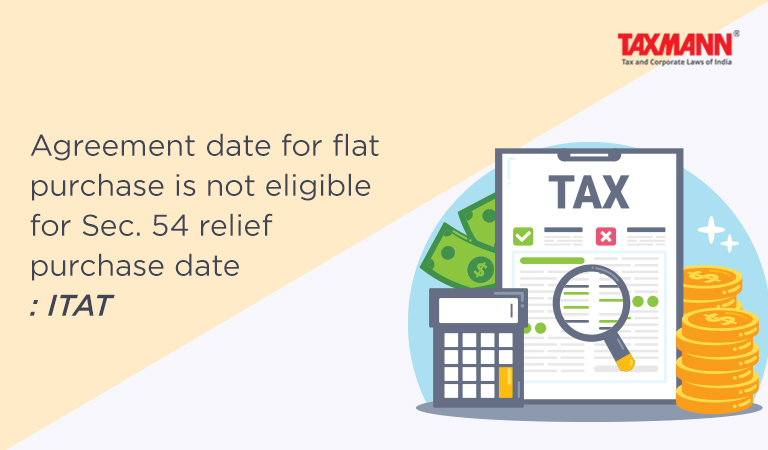Agreement date for flat purchase is not eligible for Sec. 54 relief purchase date: ITAT
- Blog|News|Income Tax|
- 2 Min Read
- By Taxmann
- |
- Last Updated on 6 March, 2023

Case Details: Sanjay Vasant Jumde v. ITO - [2023] 148 taxmann.com 34 (Pune-Trib.)
Judiciary and Counsel Details
-
- R. S. Syal, Vice-President & Partha Sarathi Chaudhury, Judicial Member
- Nikhil Pathak for the Appellant.
- Satyajit Mandal, CIT-DR, for the Respondent.
Facts of the Case
Assessee, a non-resident Indian, sold his bungalow and earned long-term capital gains during the relevant assessment year. Assessee entered into an agreement with builder for purchase of flat before one year preceding the year of sale. The possession of such flat was received after 2 months from the date of the sale of the Bungalow. Assessee claimed the cost of flat as deduction under section 54 on the long-term capital gains so earned and filed the return of income accordingly.
During the assessment proceedings, the Assessing Officer (AO) treated date of agreement with builder as date of purchase of flat. Thus, he held that the new property purchased by assessee was beyond one year preceding to sale of old property and assessee wasn’t entitled to section 54 exemption.
The Dispute Resolution Panel (DRP) also upheld the action of AO. Aggrieved by the order, assessee preferred an instant appeal to the Pune Tribunal.
ITAT Held
The Tribunal held that the assessee entered into agreement with the builder for acquiring a flat in the building. The agreement stated that the developer will construct the building and transfer the possession of flat to the assessee. The flat was not ready at the time of agreement and the building had to be constructed. Through this agreement, assessee received the right to acquire the flat after the construction of building.
This was an agreement for purchasing the flat and not a sale deed. If the flat was ready, there would have been a sale deed instead of an agreement. The possession letter was issued by the developer to the assessee after the sale date of the bungalow, which clearly shows that the assessee received possession of the new flat only after the date of sale.
Further, the relevant date to be considered is when the assessee paid full consideration amount of the flat becoming ready for occupation and obtained possession of the flat.
It was an unabated fact that at the time of execution of agreement, the residential property was not in existence. Therefore, the date of possession of the flat should be treated as the date of actual purchase to claim an exemption under section 54.
Disclaimer: The content/information published on the website is only for general information of the user and shall not be construed as legal advice. While the Taxmann has exercised reasonable efforts to ensure the veracity of information/content published, Taxmann shall be under no liability in any manner whatsoever for incorrect information, if any.

Taxmann Publications has a dedicated in-house Research & Editorial Team. This team consists of a team of Chartered Accountants, Company Secretaries, and Lawyers. This team works under the guidance and supervision of editor-in-chief Mr Rakesh Bhargava.
The Research and Editorial Team is responsible for developing reliable and accurate content for the readers. The team follows the six-sigma approach to achieve the benchmark of zero error in its publications and research platforms. The team ensures that the following publication guidelines are thoroughly followed while developing the content:
- The statutory material is obtained only from the authorized and reliable sources
- All the latest developments in the judicial and legislative fields are covered
- Prepare the analytical write-ups on current, controversial, and important issues to help the readers to understand the concept and its implications
- Every content published by Taxmann is complete, accurate and lucid
- All evidence-based statements are supported with proper reference to Section, Circular No., Notification No. or citations
- The golden rules of grammar, style and consistency are thoroughly followed
- Font and size that’s easy to read and remain consistent across all imprint and digital publications are applied



 CA | CS | CMA
CA | CS | CMA
